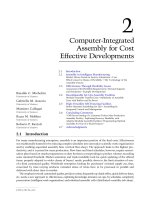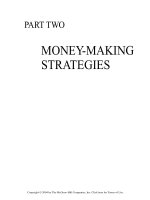Tài liệu UNDERSTANDING YOUR CREDIT REPORT AND CREDIT SCORE pptx
Bạn đang xem bản rút gọn của tài liệu. Xem và tải ngay bản đầy đủ của tài liệu tại đây (2.81 MB, 44 trang )
UNDERSTANDING YOUR
CREDIT REPORT AND
CREDIT SCORE
BUDGETING AND
MONEY MANAGEMENT
With educational materials and interactive tools, the Financial Consumer Agency of Canada (FCAC) provides objective information about
nancial products and services to help Canadians increase their nancial knowledge and condence in managing their personal nances.
FCAC informs consumers about their rights and responsibilities when dealing with banks and federally regulated trust, loan and insurance
companies. FCAC also makes sure that federally regulated nancial institutions, payment card network operators and external complaints
bodies comply with legislation and industry commitments intended to protect consumers.
© Her Majesty the Queen in Right of Canada (Financial Consumer Agency of Canada) Cat. No.: FC5-8/25-2012F-PDF ISBN: 978-1-100-99302-7 August 2012
About Financial Consumer Agency of Canada (FCAC)
Contact Us:
Toll-free:
1-866-461-3222
Website:
fcac.gc.ca
TTY:
613-947-7771 or
1-866-914-6097
Follow @FCACan
on Twitter
Subscribe to FCACan
YouTube Channel
1
TABLE OF CONTENTS
Overview 2
Credit report and score basics 3
What is a credit report? 3
What is a credit score? 4
Who creates my credit report and score? 5
Who can use my credit report and score? 6
How to understand your credit report 7
What is in my credit report? 7
How long does information stay on my credit report? 8
How are my debts rated on my credit report? 13
How can I build my credit history for my credit report? 15
How to improve your credit score 16
1. Payment history 16
2. Use of available credit 17
3. Length of credit history 18
4. Number of inquiries 18
5. Types of credit 19
How to correct errors and check for fraud 20
Steps to correct errors 21
How can I use my credit report to protect myself against fraud? 22
How to order your credit report and score 23
How can I get my credit report for free? 23
How can I order my credit report or score for a fee? 24
How can I contact Equifax Canada? 24
How can I contact TransUnion Canada? 25
Examples of credit report and scores 26
2
OVERVIEW
Building a good credit history is important for your nancial health.
Along with millions of other Canadians, you have a credit history that is kept on le by companies
called credit reporting agencies. They track how you use credit products, such as credit cards and
loans, and pay your bills.
This information is used to create your credit report and credit score. These are some of the main
tools lenders use when they decide whether they will lend you money and how much they will
charge you to borrow it. Employers and landlords may also use credit reports to get a sense of
your reliability.
You have the right to see your own credit report. And there are ways you can get it for free.
Knowing what is in your report is important. If you have a poor credit history, it could be harder for
you to get a credit card or a loan. You could have to pay more to borrow money. It could even aect
your ability to rent housing or get hired for a job.
You can also use your credit report to check for signs of identity theft.
This guide can help you:
• understandyourcreditreportandscore
• improveyourcreditscore
• correcterrorsinyourcreditreport
• orderyourcreditreportandscore.
3
CREDIT REPORT AND SCORE BASICS
What is a credit report?
Your credit report is a summary of your credit history. If you have ever used a credit card, taken out
a personal loan, or used a “buy now, pay later” oer, you have a credit history.
Your credit report is created when you borrow money or apply for credit for the rst time. Lenders
send information about your accounts to the credit reporting agencies. Your credit report also
includes personal information that is available in public records, such as a bankruptcy.
Your credit report contains factual information about your credit cards and loans, such as:
• whenyouopenedyouraccount
• howmuchyouowe
• whetheryoumakeyourpaymentsontime
• whetheryoumisspayments
• whetheryougooveryourcreditlimit.
Mobile phone and Internet accounts may be reported, even though they are not credit accounts.
Chequing and savings accounts that have been closed “for cause,” due to money owing or fraud
committed by the account holder, can also be included.
4
What is a credit score?
A credit score is a three-digit number that is calculated using a mathematical formula based on the
information in your credit report. You get points for actions that demonstrate to lenders that you can
use credit responsibly. You lose points for things that show you have diculty managing credit. To
nd out what counts toward your credit score, see page 16.
In Canada, credit scores range from 300 to 900 points. The best score is 900 points.
Lenders and credit reporting agencies produce credit scores under dierent brand names, such as
Beacon, Empirica and FICO®.
Your score will change over time as your credit report is updated.
Businesses use your credit report and score to see how risky it would be for them to lend you money.
It is up to each lender to decide on the lowest score you can have and still borrow money from them.
Lenders may also use your score to set your interest rate and credit limit. If you have a high credit
score, you may be able to get a lower interest rate on loans, which can save you a lot of money over time.
While they are very important, credit scores are usually not the only thing a lender will look at. Often,
they will also consider other factors, such as your income, job or any assets you own.
Why might the credit score I receive be dierent from one
a lender is using?
A credit score you order for yourself may not be the same as a score produced for a lender.
This can happen even if they are created at the same time using the same information in your
credit report because there are dierent types of credit scores that are designed to meet the
needs of lenders.
A lender may put more weight on certain information depending on the reason it is calculating
your score. For example, it may want to assess your risk of becoming bankrupt or determine
whether you qualify for a mortgage.
Your own credit score should still be in the same range as a score created for a lender.
5
Take credit for your actions!
Do you have a strong credit score? Use this to your advantage when you negotiate for a loan.
Point out that you represent a lower risk to the lender and ask for a lower interest rate or
better terms.
Who creates my credit report and score?
Credit reporting agencies are private companies that collect, store and share information about how
you use credit. An agency is also called a “credit bureau” or just a “bureau.”
These agencies are governed by regulations that cover many parts of their business, such as who is
allowed to see your credit report and what it can be used for.
In Canada, there are two main credit reporting agencies: Equifax Canada and TransUnion Canada.
These agencies sell credit reports to their members, which include banks, credit unions and other
nancial institutions, credit card companies, auto leasing companies and retailers. These businesses
use your credit report to help them make their decisions about you.
Other organizations also use it to check your use of credit and personal trustworthiness. Those
allowed to use your credit report include mobile phone companies, insurance companies,
governments, employers and landlords.
When a lender or other organization “checks your credit” or “pulls your report,” it is accessing
your credit report at the credit reporting agency. This is usually recorded on your credit report as
an “inquiry.”
Lenders provide the information in your credit report to the credit reporting agencies. Other sources
of information include collection agencies, oces that handle child support and public records led
with courthouses.
5
6
Who can use my credit report and score?
There are regulations in place to protect your personal information, including your credit report.
Usually, your credit report can only be used to:
• lendmoneyorextendcredittoyou
• collectonadebtyouowe
• consideryouforrentalhousingorforajob
• provideyouwithinsurance(someprovinceshaverestrictions)
• meetadirectbusinessneed.
Lenders, employers or landlords can only use your credit report when you give your consent or, in
someprovinces(includingNovaScotia,Ontario,Quebec,PrinceEdwardIslandandSaskatchewan),
after they tell you they will be checking your report.
Usually, when you sign an application for credit, you allow the lender to access your credit report.
Your consent generally lets the lender use your credit report when you rst apply and anytime
afterward while your account is open.
In many cases, your consent also lets the lender share information about you with the credit
reporting agencies if your application is approved.
Someprovinciallawspermitgovernmentrepresentatives,includingjudgesandpolice,toseeparts
of your credit report without your consent.
In some provinces, your credit score cannot be used to decide whether you qualify for insurance or
to determine how much you will be charged for insurance coverage. In some cases, insurers are not
allowed to use your credit score when deciding whether to oer you specic types of coverage, such
as auto or mortgage insurance.
Someprovincesrequirelendersandotherstotellyouifyourcreditreportledtoyoubeingrefused
for a benet or service, or if you have to pay more for it.
For more information about provincial and territorial laws, contact the government oce that
handles consumer aairs in your area.
7
HOW TO UNDERSTAND YOUR
CREDIT REPORT
What is in my credit report?
Your credit report may contain the following information:
Personal information
• Name
• Date of birth
• Currentandpreviousaddresses
• Currentandprevioustelephone numbers
• Social Insurance Number (SIN)
• Driver’s licence
• Passport number
• Currentandpreviousemployers
Credit history information
• Credit accounts and transactions, such as credit cards, retail or store cards, lines of credit and loans
• Telecommunications accounts, such as mobile phone and Internet
• Negative banking information, such as chequing and savings accounts closed “for cause,”
duetomoneyowingorfraudcommittedbytheaccountholder,andbadcheques(alsocalled
non-sucientfundsorNSFcheques)
• Public records, such as bankruptcy and legal judgments, and registered items, such as a lien
on a car or house that allows the lender to seize it if you do not make payments
• Debts sent to collection agencies
• Inquiries from lenders and others who request your credit report
• Remarks including consumer statements, fraud alerts and identity verication alerts.
8
Is my mortgage included in my credit report?
Your mortgage information and your history of mortgage payments may appear in your credit
report and may count count toward your credit score. This depends on the practices of each credit
reporting agency.
A home equity line of credit that is added to your mortgage will be treated as part of your mortgage
for your credit report. If your home equity line of credit is a separate account from your mortgage, it
can be reported separately.
How long does information stay on my credit report?
By law, negative information can only be kept on your credit report for a certain length of time. For
most information, the maximum is six or seven years. The exact amount of time varies by category
andbyprovinceorterritory.Positiveinformation,suchasaccountsthatyoupaidontime,maybe
kept longer.
Equifax Canada and TransUnion Canada keep your information for dierent lengths of time, up
to the maximum time limits allowed by provincial laws.
Length of time that credit reporting agencies keep information
Type of information
How long agencies
keep information
Date when agencies
start counting
Credit transactions
• Negativeinformation
about accounts such as
credit cards, lines of credit
and loans
• Alsocalled“trades”or
“trade lines” by credit
reporting agencies
•6 years • Equifaxcountsfromdateoflast
activity(forexample,apayment
youmade)
• TransUnioncountsfromdate
of rst delinquency – the date
you rst defaulted on the
account(forexample,by
makingalatepayment)without
returning to good standing.
Secured loans
• Loansbackedbyanasset,
such as a mortgage, a car
lease or loan
• 6 years
• Equifaxonly:7–10 years
inP.E.I.
• Equifaxcountsfromdateofling
• TransUnioncountsfromdateof
rst delinquency
Banking items
• Negativeinformation,
including:
- chequing and savings
accounts closed “for
cause” due to money
owing or fraud committed
by the account holder
- badcheques(alsocalled
non-sucient funds
orNSF)
• 6 years • Equifaxcountsfromdateof
transaction or default
• TransUnioncountsfromdate
of write-o or date closed,
whichever is sooner
9
10
Type of information
How long agencies
keep information
Date when agencies
start counting
Inquiries
• Recordedwhenlenders
and others access your
credit report
• Formoreinformationon
“hard” and “soft” inquiries,
see page 18
• Equifax:3 years
• TransUnion:6 years
• Countedfromdateinquiry
is made
Judgments
• Legaljudgments
against you and
other information in
public records
• 6 years
• Equifax:7–10 yearsinP.E.I.
• TransUnion:7 years in Ontario,
Quebec,NewBrunswickand
NewfoundlandandLabrador;
10 yearsinP.E.I.
• Countedfromdateofling
Collections
• Debtssenttocollection
agencies
• 6 years • Equifaxcountsfromdatethedebt
is assigned to a collection agency
• TransUnioncountsfromdateof
rstdelinquency(whenthe
account became delinquent with
the original lender, not when it
wassenttoacollectionagency)
Length of time that credit reporting agencies keep information
Type of information
How long agencies
keep information
Date when agencies
start counting
Registered items
• Itemsregisteredinpublic
records, such as a lien
against your property
• Equifax:6 years, except in
P.E.I.whereitis7–10 years
• TransUnion:5 years
• Countedfromdateofling
Bankruptcy
• Legalprocedureused
as a last resort if you are
unable to repay
your debts
• 6 years
• TransUniononly:7 years in
Ontario,Quebec,New
Brunswick,Newfoundland
andLabrador,andP.E.I.
• Countedfromdateofdischarge
• Ifnotdischarged:
- Equifax keeps for maximum
of 7 years from ling date
- TransUnion: no time limit
Multiple bankruptcies
• Dierentlengthoftime
applies if you declare
bankruptcy more
than once
• 14 years • Countedfromdateofdischarge
for each bankruptcy
Consumer proposals
• Formalprocedureto
repay your debts,
arranged by trustee in
bankruptcy or other
authorized agent
• 3 years • Equifaxcountsfromdatepaid
• TransUnioncountsfromdate
satised or 6 years from ling
date, whichever is sooner
• Ifnotpaidorsatised,maximum
is 6 years from ling date
11
12
12
Type of information
How long agencies
keep information
Date when agencies
start counting
Orderly Payment of
Debts (OPD)
• Alsoknownasa
consolidation order
• Formalproceduretorepay
your debts, arranged
through a court
• OnlyavailableinAlberta,
Saskatchewanand
NovaScotia
• Equifax:3 years
• TransUnion:OPDitselfis
not reported
• Equifaxcountsfromdatepaid
• TransUnion:individualaccounts
includedinOPDstayonlefor
2yearsfromdateOPDissatised
or 6 years from date of rst
delinquency, whichever is sooner
Debt Management
Program (DMP) with
credit counselling agency
• Programtohelpyou
repay your debts
• Note:creditcounselling
byitself(withoutDMP)
is not noted on your
credit report
• Equifax:3 years
• TransUnion:DMPitselfisnot
reported
• Equifaxcountsfromdatepaid.If
not paid, counts for a maximum
of 6 years from ling date.
• TransUnion:individualaccounts
includedinDMPstayonlefor
2yearsfromdateDMPissatised
or 6 years from date of rst
delinquency, whichever is sooner
Remarks
• Statementsyoucanadd
to your credit report,
including:
- consumer statements
- fraud alerts
- identity verication alerts
• 6 years • Countsfromdatereported
to agency
Length of time that credit reporting agencies keep information
13
How are my debts rated on my credit report?
Lenders may use codes when they send information to the credit reporting agencies about how and
when you make your payments. These codes can have two parts: a letter and a number. For example,
anaccountmaybecodedasR2.Theletterstandsforthetypeofthecredityouareusing.
Letter Meaning Example
I
Installment credit
You borrow money for a specic period of time and
repay it in xed amounts, on a regular basis, until the
loan is paid o.
• carloan
O
Open status credit
You can borrow money when you need to, up to a
certain limit.
• lineofcredit
R
Revolving or recurring credit
You can borrow money up to your credit limit on an
ongoing basis. You make regular payments in varying
amounts depending on the balance of your account.
• creditcard
M
Mortgage loan
Mortgage information may be included on
your credit report.
• mortgage
14
The codes also use numbers that range from 1 to 9. The best rating is 1. It means you pay your bills
within30daysofthebillingdate.Ratingsof1willhelpyouachieveastrongcreditscore.
Any number higher than 1 will likely hurt your credit score. The worst rating you can receive is 9. It
usually means the lender has written your account o or sent it to a collection agency.
Number Meaning
0
• Toonewtorate
• Approved,butnotyetused
1
• Paidwithin30daysofbilling
• Paysasagreed
2 • Latepayment:31–59dayslate
3 • Latepayment:60–89dayslate
4 • Latepayment:90–119dayslate
5 • Latepayment:morethan120dayslate,butnotyetrated“9”
6 • Thiscodeisnotused
7
• Makingregularpaymentsunderaconsolidationorder,OrderlyPaymentofDebts,
consumerproposalorDebtManagementProgramwithacreditcounsellingagency
8 • Repossession
9
• Writtenoasa“baddebt”
• Senttocollectionagency
• Bankruptcy
14
15
Each of your credit accounts will have one of these codes. The codes can be dierent depending on
how you make your payments for each account.
Forexample,ifyouhaveacreditcardaccountthatyoupaidontime,itwillbereportedas“R1.”Ifyou
alsohavealineofcredit,andyoumissedyourpaymentby45days,itwouldshowupas“O2.”
TransUnionCanadaalsousesacharttoshowyourhistoryofpaymentsoverthelasttwoyears.See
page 28 for an example.
How can I build my credit history for my credit report?
It is important to begin building your credit history early. If you do not have a credit history, it is much
harder for lenders to make a decision about you, since they have nothing to base it on.
One of the best ways to build a credit history is to apply for a credit card and make your payments on time.
It can sometimes be hard to get a regular credit card if you are a young person, a recent immigrant or
have had trouble with credit in the past.
An option is to apply for a secured credit card. You need to provide the credit card issuer with a
deposit. Usually, the amount required for a deposit is equal to the credit limit for the credit card.
When you make payments on the balance of a secured credit card, it will be reported to the credit
reporting agencies in the same way as a regular credit card. This can help you build a credit history or
rebuild a poor one.
Are secured credit cards and prepaid cards the same thing?
No, they are not the same. A secured credit card can help you establish a credit history.
However, a prepaid card will not help you build a credit history because your use of it is not
reported to the credit reporting agencies.
HOW TO IMPROVE YOUR CREDIT SCORE
The actual formulas used to calculate credit scores are the property of private companies and are not
available to the public. This means it is not possible to know exactly how many points your score will go
up or down based on the actions you take.
However, the main factors that are used to calculate your score include:
• paymenthistory
• useofavailablecredit
• lengthofcredithistory
• numberofinquiries
• typesofcredit.
1. Payment history
This is the most important factor for your credit score. It shows:
• whenyoupaidyourbills
• lateormissedpayments
• debtsyoudidnotpaythatwerewrittenoorsenttoacollectionagency
• whetheryouhavedeclaredbankruptcy.
Your score will be damaged if you:
• makelatepayments—thelongerittakesyoutomakeyourpayment,theworsetheimpacton
your credit report and score will likely be
• haveaccountsthataresenttoacollectionagency
• declarebankruptcy
• withholdpaymentsduetoadisputeandthelenderreportsyourpaymentsaslate.
With certain nancial products, any payments you make on time will not be counted and will not
improve your credit score. However, if you miss payments and your account is sent to a collection
16
17
agency, this can be included and will damage your credit score. These products include:
• chequingandsavingsaccounts
• studentloans
• prepaidcards(thesearenotthesameassecuredcreditcards).
Telecommunicationsaccounts,suchasmobilephoneandInternet,areexceptions.Paymentsyoumake
on time as well as late payments may be considered for your credit score.
TIPS:
To improve your credit score
• Alwaysmakeyourpaymentsontime.Ifyoucannotpaythefullamount,makeatleastthe
minimum payment.
• Ifyouthinkyouwillhavetroublepayingabill,contactthelenderrightaway.
Seeifyoucanworkoutaspecialarrangementtorepayyourdebt.
2. Use of available credit
This is the second most important factor. It is also called “credit utilization.”
To gure out your available credit, add up the credit limits for all your credit products, such as credit
cards, lines of credit and other loans.
What counts toward your credit score is how much of your available credit you actually use, not your
credit limits by themselves.
When you use a large percentage of your available credit, lenders see you as a greater risk, even if you
pay your balance in full by the due date.
TIP:
To improve your credit score
• Trytouselessthan35 percent of your available credit.
Forexample,ifyouhaveacreditcardwithalimitof$5,000andalineofcreditwithalimit
of$10,000,youravailablecreditis$15,000.Trynottoborrowmorethan$5,250atanytime
(35percentof$15,000).
18
3. Length of credit history
The longer you have had an account open and used it, the better it is for your score.
Your credit score may be lower if:
• youhavecreditaccountsthatarerelativelynew
• youcloseyourolderaccountsandyourremainingcreditaccountsarenewer—forexample,if
you close a credit card account and transfer the balance to a new card.
TIP:
To improve your credit score
• Considerkeepinganolderaccountopenevenifyounolongerneedtouseit,especiallyif
there is no annual fee. Use it from time to time to keep it active.
4. Number of inquiries
When lenders and others ask a credit reporting agency for your credit report, it is recorded as an
inquiry. This usually happens when you apply for credit.
It is normal and expected to seek credit every so often. But if there are too many inquiries on your credit
report, lenders may be concerned. It can seem like you are desperately seeking credit or that you are
trying to live beyond your means without the ability to pay back the money you want to borrow.
“Hard hits” versus “soft hits”
Inquiries that are recorded on your credit report and count toward your credit score are sometimes
called “hard hits.” Anyone who views your credit report will see these inquiries. An application for a credit
cardisanexampleofa“hardhit.”Rentalandemploymentapplicationsmay be treated as “hard hits.”
19
“Softhits”aretheopposite.Onlyyoucansee“softhits.”Theseinquiriesdonotaectyourcreditscore
in any way. Examples of “soft hits” include:
• requestingyourowncreditreport
• businessesaskingforyourcreditreporttoupdatetheirrecordsaboutanexistingaccountyou
have with them. They do this to see whether you qualify for promotions, credit limit increases
and so on.
Will shopping around for a car or mortgage hurt my score?
When you are shopping around for a car or a mortgage, try to do it within a two-week period. All
inquiries related to auto or mortgage loans made during this time are usually combined and treated
as a single inquiry.
TIP:
To improve your credit score
• Limitthenumberoftimesyouapplyforcreditinashortperiodoftime.Itisagoodideato
seek credit only when you really need it.
5. Types of credit
Your score may be lower if you only have one type of credit product, such as a credit card.
It is better to have a mix of dierent types of credit, such as a credit card, auto loan, line of credit or
other loan. It can even help if you have a second but dierent type of credit card, such as an account
with a store.
TIP:
To help your credit score
• Havingamixofcreditproductscouldgetyoumorepoints,butdon’tgooverboard!
Make sure you can aord to pay back any money you borrow. Otherwise, you could
end up hurting your score by taking on more debt than you can handle.
20
HOW TO CORRECT ERRORS AND
CHECK FOR FRAUD
Check your credit report at least once a year for errors and signs of identity theft. Think of it as an
annualcheckupforyournancialhealth!
You have the right to dispute any information on your credit report that you believe is wrong.
Youcanaskthecreditreportingagenciestocorrecterrors.It’sfree.
Watch out for:
• mistakesinyourpersonalinformation,suchaswrongmailingaddressesorincorrect
date of birth
• errorsincreditcardandloanaccounts,suchasapaymentyoumadeontimethatis
shown as late
• negativeinformationaboutyouraccountsthatisstilllistedafterthemaximumnumber
of years it is allowed to stay on your report
• accountslistedthatyouneveropenedyourself,whichcouldbeasignofidentitytheft.
Why do errors matter?
They may give lenders the wrong impression. You could be turned down for an application or receive
a lower credit score than you should have. Even errors that seem minor, such as a misspelled name or
a wrong address, could cause problems when you apply for credit.
What cannot be changed?
You cannot change factual, accurate information related to a credit account. For example, if you
missed payments on a loan or a credit card, paying the debt in full or closing the account will
notremovethenegativehistory.Negativeinformationwillonlyberemovedafteracertain
amount of time.
Watch out for “credit repair” companies that claim they can eliminate negative information, for a fee,
before the date it would normally be removed from your credit report. This is not possible.
21
Step Actions you can take
1. Support your
case
Gather receipts, statements and other documents related to your credit
account. You may need these to prove your claim.
2. Contact
the credit
reporting
agencies
Usetheirformforcorrectingerrorsandupdatinginformation.Dothisforboth
Equifax Canada and TransUnion Canada.
Before the agencies can make any changes, they rst need to check your claim
with the lender that reported the information.
If the lender agrees there is an error, the agencies will update your credit report.
However, if the lender conrms the information is correct, the agencies will not
make any changes.
3. Contact the
lender
You may be able to speed up the process by contacting the lender yourself
about the error. Ask the lender to verify its les and provide the credit reporting
agencies with updated information.
4. Escalate
your case
Notsatisedwiththeresultsoftheinvestigation?Asktospeakwithsomeoneat
a higher level at the credit reporting agency or the lender.
If the lender is a federally regulated nancial institution, and it will not correct
the error, ask for information on its complaint-handling process.
5. Add a
consumer
statement
If you are still not satised, ask the credit reporting agencies to add a consumer
statement. This lets you provide details about an item on your report, using up
to100words(or200wordsinSaskatchewan).It’sfreeofcharge.
Lenders and others who look at your credit report may consider your consumer
statement when they make their decisions.
Steps to correct errors
22
How can I make a complaint?
If you feel you have not been treated properly by a credit reporting agency, you can make a written
complaint to the oce of your provincial or territorial government that handles consumer aairs.
How can I use my credit report to protect myself against fraud?
Look for accounts that do not belong to you. It could mean you have been targeted by fraudsters
who have applied for a credit card, mortgage or other loan in your name.
Have you been a victim of fraud?
Ask the credit reporting agencies to put a fraud alert on your le.
It tells lenders to contact you and conrm your identity before they approve any applications for
credit. The aim is to prevent any further fraud from happening.
How can I add an identity verication alert?
Under provincial law in Manitoba and Ontario, you have the right to add an identity verication alert,
which asks lenders to contact you to conrm your identity before they approve any credit applications.
You do not need to be a victim of fraud to do this. There may be a small fee to add it.
23
HOW TO ORDER YOUR CREDIT REPORT
AND SCORE
You can order your credit report from the credit reporting agencies by mail, fax, telephone, online
or in person. You can order your credit scoreonline.Forcontactinformation,seepages24and25.
Equifax Canada and TransUnion Canada may have dierent information about you in their les, so
you should order your credit report from both agencies at least once a year.
Consider requesting your report from one agency and then waiting six months before you order
from the other agency. By spacing out your requests in this way, you may be able to detect any
problems sooner.
How can I get my credit report for free?
Your free credit report is called a “credit le disclosure” by Equifax Canada and a “consumer disclosure”
by TransUnion Canada. Ordering your own credit report has no eect on your credit score.
To get your credit report free of charge:
• youmayorder it by mail, fax, telephone or in person
• youmustreceive it by mail or in person.
If you choose to access it online, you will have to pay a fee.
To order by mail or fax:
• makeyourrequestinwritingusingtheformyoucanndonthewebsitesofthecreditreporting
agencies
• providecopiesoftwopiecesofacceptableidentication.
To order by telephone:
• callthecreditreportingagencyandfollowtheautomatedprompts
• conrmyouridentitybyansweringaseriesofpersonalandnancialquestionsandproviding
yourSocialInsuranceNumber(SIN)and/oracreditcardnumber.









